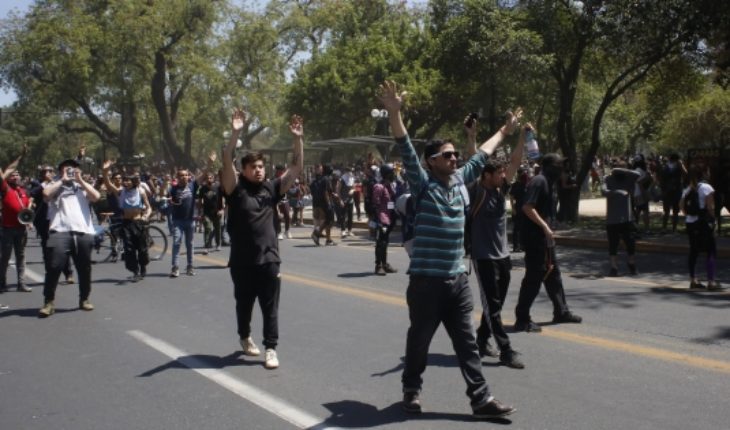Recent events in the country have led some to raise their voices by pointing out that the National Intelligence Agency (ANI) has failed. Probably last Friday, October 18, it will be remembered as the day of the first concerted and coordinated attack on Santiago’s critical infrastructure, triggering an outbreak of social movements of different kinds. Something similar was experienced by some South American countries recently, so it could be assumed that there was available evidence to establish a national strategic alert based on these indicators.
Intelligence, together with counterintelligence, are two activities of the State aimed on the one hand to provide the authorities in office, starting with the President of the Republic, with useful and relevant information for the decision-making process strategic, even more so when the rule of law or peace is affected. Counterintelligence, also covered in the same Intelligence Act, 19.974 of 2004, must take care of the custody of the State’s information assets, as well as protecting the people who are key to it, starting with the same members of the system, which you must control. This Law refers to a “National Intelligence System”, where the ANI is only a part of it. Is it right then to criticize a single body, or should the national intelligence system defined in the Act be criticized?
In order for this very valuable product to be generated for the state called Intelligence, there must be strategic direction. It should be noted precisely that we must look for, and finance the costs that this entails, since without that strategic direction the system agencies do not know what to look for. Moreover, the fortuitous fact of finding relevant information, despite not looking for it, which the academic world defines as “serendipia” and which in colloquial language is called “chiripazo”, occurs at the very least of the times, so that basing the collaboration of the system on the mere euphemism of “residual information” does not solve the problem properly. Intelligence is not the same as a google search engine, who is asked anything and responds on the spot, but we must recognize that much of the information today is obtained from open sources. Nor is intelligence necessarily evidence, to prosecute crimes and support public prosecutors. With the great interdependence of transnational systems and activities, intelligence necessarily crosses borders and requires the collaboration of similar agencies, which is done face-to-face, so personal knowledge is essential for develop the necessary trust between the various international actors. Finally there is no computer system that can replace people, that classic and remarkable group of agents, men and women, who silently and secretly manage to obtain the essential pieces of information from closed sources, essential for this state activity. HUMINT, as it is known in international jargon, is the most important capacity that a state must develop, with its own school and doctrine.
We must then be able to rethink the national intelligence system, just as the United States did after 9/11 where it went from 16 intelligence agencies that did not effectively collaborate to a system with an additional agency, the Directorate of Intelligence National (DNI) by General James Clapper or as in Spain achieved by General Félix Sanz Roldán in charge of the National Intelligence Center, who survived multiple governments and units of different ministries, both in the interior and in defence and presidency of the government.
We must also take very seriously what the development of the national Technical Intelligence capacity (SIGINIT, ELINT, MASINT, GEOINT, OSINT, etc.) that began in all countries with radio interception and which today operates even in space and in the cyberspace, as the British foreign ministry does with GCHQ, the U.S. defense ministry with the NSA or Israel with its 8200 unit.
It is essential for the country to have a National Intelligence Strategy, which covers each presidential term, that is the strategic guideline of the search effort and that is developed by each government team before reaching the Currency, but that the National Annual Intelligence Plan, converse with the Budget Act, in such a way that we can align the strategic effort with the necessary resources according to the strategic indicators, given that the effort under normal conditions is not the same when crises of any kind are generated. It cannot be that in parliament it is decided to leave with a weight the items of expenses reserved to finance police intelligence activities. This shows not understanding the importance of this activity. The facts today in the eyes of the whole country prove this.
At present, virtually all manage for risks and it is precisely that map of risks and threats to the country that must be reviewed in a score, not only to agree with them, but also to validate the probability of occurrence of them (at least as low, medium or high), but the impact they have on the country, along with the respective plans to mitigate these risks (at least reducing the impact), along with the associated planning to take care of each of them. These scenarios should always be reviewed with the assumption of “what if” (the well-known Anglo-Saxon “What If”). It is remarkable then that the World Economic Forum every year assesses global risks and in the last two years we are told that the two or three most harmful and most likely risks of occurrence are associated with natural disasters, for which we have the O NEMI (and soon a National Emergency Agency) to take over, but for which it appears in third or fourth place, the Cyberattacks, we do not yet have a State agency in charge of managing them.
If we want to live in peace, we must anticipate the threats that may affect us and that requires investing in a better national intelligence system as well as a new national cybersecurity system. The framework law of cybersecurity must be expedited in the development of amendments to the Intelligence Act on the basis of lived experience, as well as the executive must enter the framework law of cybersecurity at the shortest time, formalizing already with a position in the State , presidential delegate Mario Farren.
From the Senate, where we are processing the reform to the Intelligence Act in the United Security and Defense Commission, we will put all our capabilities, from external advisors and experts on the matter to get this new National System of Intelligence, we talk to the budget law annually and we hope that it will enter very soon, to be dealt with by the same united commission, the framework law of Cybersecurity. Without National Systems, with defined and standardized processes, competent and trained people and sufficient budget, it is impossible to guarantee the country to anticipate or face the complex and asymmetrical threats that today affect humanity and our country in particular.
The content poured into this opinion column is the sole responsibility of its author, and does not necessarily reflect the editorial line or position of El Mostrador.
translated from Spanish: It’s time for Chile to have a new national intelligence system
November 3, 2019 |





